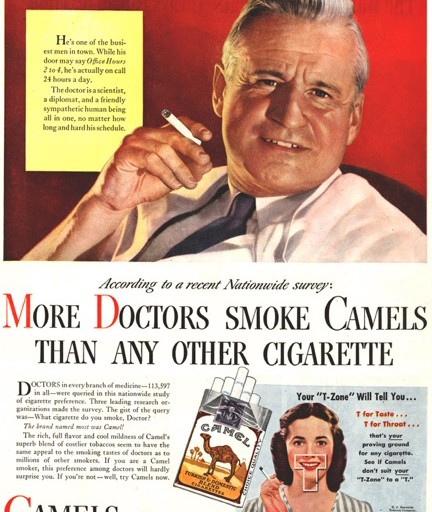Written by Luis Gallardo
Long gone are the days when companies such as cigarette manufacturer Camel could whip up slogans like, “More doctors smoke Camels than any other cigarette” to sell their products. Aside from the now-absurd concept of doctors promoting smoking, the one-size-fits-all directness of this strategy no longer holds water.
Advertising has changed drastically within even the past decade, and consumers are savvier than ever at spotting half-hearted or poorly executed advertising. Now advertising is most effective as an intimate exchange of information between business and customer.
Social media, mobile, and big data have all contributed to these changes. And the sheer amount of time consumers spend watching video content opens doors for brands to produce content people actually want to watch.
But there’s still a big curve in the road ahead. In the coming years, brands will need to change their image from being focused on themselves to being focused on consumers. Even B2B companies need to understand that the train stops at consumers, so they need to connect more directly.
The game changers ushering in this new era are the often-misunderstood generation we call Millennials.
As the Millennial generation takes the reigns from previous generations to become household heads, primary wage earners, and politically present individuals, they’re beginning to dictate a new era of marketing.
Millennials are often thought of as self-centered, helpless young people who only know how to connect with others through their smartphones. But many of these accusations aren’t accurate for much of the generation. If you want to successfully market to this increasingly influential group, you need to first understand them.
In the U.S., Millennials make up 25% of the population, outnumbering Baby Boomers by about 3 million. They include all those 20-somethings who are graduating college and becoming opinionated, educated, and active participants in society. Having lived through two recessions, most of them are frugal. The digital age has educated them about where their money goes when they do spend it, making them conscientious consumers who care about the brands they support as much as the shoes they take home.
While older generations might have viewed advertising as the means through which businesses communicated what they had to offer, Millennials distrust overt selling. They have a cynical streak and know that companies pay experts to support whatever the brand’s agenda is, so Millennials trust real people more who offer real experiences and reviews—even if they’re strangers.
They also prefer spending money on things that add real value to their lives—either in experiences or products—or to the world. I like to call this generation “Generation C” for “compassion” because they’re informed about global problems and believe they have the power to influence change. National Geographic is effectively connecting with these conscientious consumers through engaging videos that support nonprofits’ efforts around the world.
Engaging through authentic common ground and revealing how your brand reflects consumers’ values is key. Verizon’s Stop-Motion Studio workshops were a genius strategy for engaging on a personal level. The brand got people in Verizon’s stores to learn about products they already use, while enjoying themselves in the process. This kind of engagement helps consumers feel like they’re building a relationship with a brand—almost as if the company were a person.
HUMANIZE YOUR BRAND
To succeed in the coming years, brands should start thinking and acting as people.Archetypes and brand attributes have to be moved into real personalities and principles.
For example, if you sell diapers, you might hire experts to break down the science of why your product is better than a competitor’s. But because the younger generation (who now includes young parents) trusts real people over experts, you better make sure that expert is also a parent.
Instead of a campaign focusing on beautiful babies in perfect diapers, advertising personalities must combine personal experience and expertise to connect with parents both professionally and personally. We’re reaching a point where consumers will only trust your brand if they can relate to it like a friend.
Millennials are the up-and-coming generation that will either choose to support your brand or let it fall by the wayside. If you want to stay relevant to them, your advertising tactics need to get up close and personal.
ARTICLE HIGHLIGHTS:
- Even B2B companies need to understand that the train stops at consumers, so they need to connect more directly.
- Millennials trust real people more who offer real experiences and reviews—even if they’re strangers.
- To succeed in the coming years, brands should start thinking and acting as people.
Previously published in CMO by Adobe.

